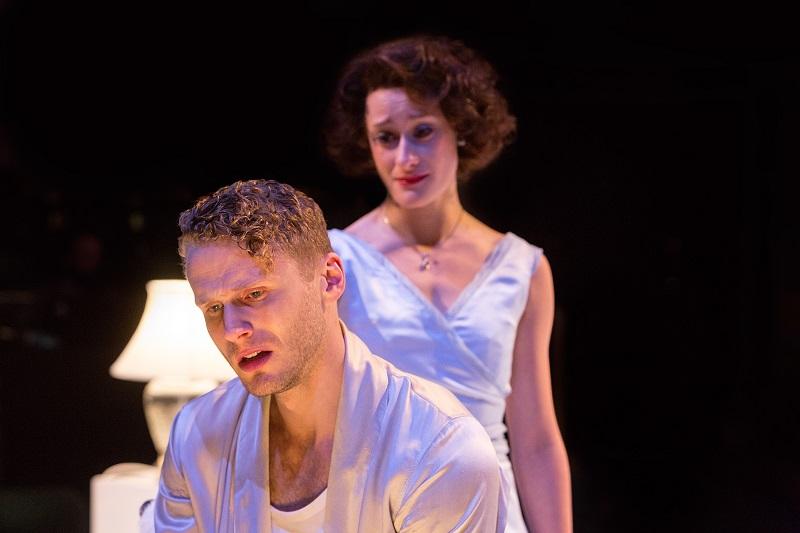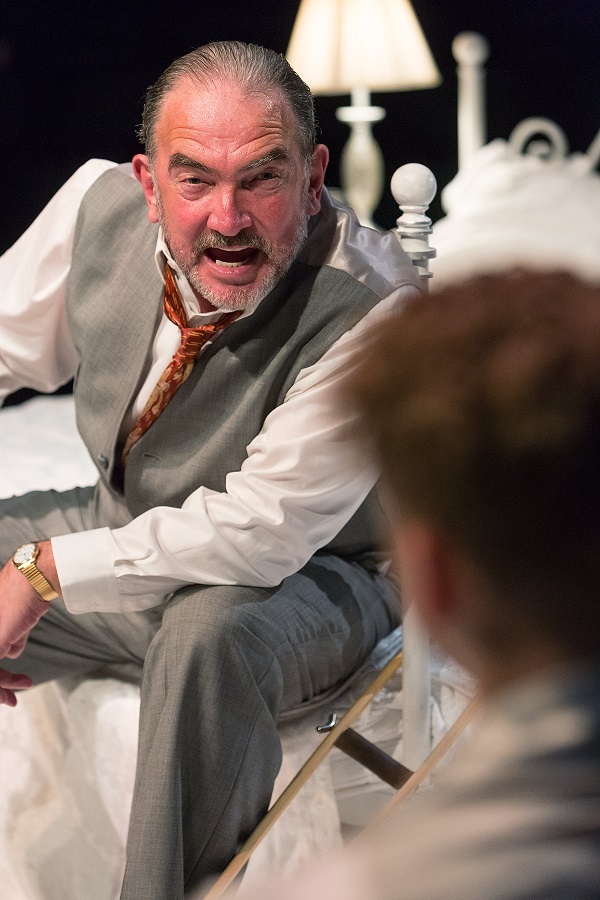Cat on a Hot Tin Roof, Royal Exchange, Manchester | reviews, news & interviews
Cat on a Hot Tin Roof, Royal Exchange, Manchester
Cat on a Hot Tin Roof, Royal Exchange, Manchester
Tennessee Williams revival is more lukewarm than hot

No one is more prescriptive than Tennessee Williams when it comes to stage and set directions. As he got older and wiser he made allowances for directors and actors to have their say. “The making of a play is, finally, a collaborative venture,” he concluded. What he would make of the Royal Exchange’s self-styled “bold adaptation” of his favourite play, winner of the Pulitzer Prize in 1955, is debatable.
However, Williams would certainly approve of director James Dacre’s decision to opt for the original version of Act Three rather than that with a softer, more “commercial” ending written at the urging of director Elia Kazan for the Broadway premiere. The playwright decided later that collaboration could go too far.
The play is about all our efforts to escape from inner demons, love and even life itself, if only by denial
The play is set – or supposed to be set – in an old-world, comfortable plantation home in the Mississippi Delta, where ostensibly the family are gathered to celebrate Big Daddy Pollitt’s 65th birthday on a summer’s evening 60 years ago. It takes place in real time, the action matching the duration of the performance (two hours 40 minutes). Early on Maggie (the “cat”), who is married to Big Daddy’s younger and favourite son Brick, one-time American football star turned TV commentator (you know the sort) but now a self-loathing alcoholic, says pointedly: “I’m not living with you. We occupy the same cage”.
Designer Mike Britton’s spacious bed-sitting room set, all white tiles and furniture like a hotel lobby, lacks any atmosphere. Symbolically, the bed looms large (this is where the real battles are fought). The slatted-wood, suspended ceiling, with whirling fans and outsize chandelier, sort of reflects Maggie’s telling taunt. We hear noises off as the birthday party goes on while Maggie and Brick argue. And as the play moves on, Big Daddy’s grandchildren run in and out. It doesn’t quite work, but this is the room where, despite the bed, the family come together.
“Mendacity” is Big Daddy’s favourite word as his dysfunctional family struggles with marital relationships, greed, alcoholism and ghosts of homosexuality – troubles which persist despite the fact he is the biggest cotton-growing land-owner in the Delta. He’s clawed his way to the top.
 Essentially, the play is about all our efforts to escape from inner demons, love and even life itself, if only by denial. There is denial of Big Daddy’s fatal cancer, denial of Brick’s alcoholism and suppressed homosexuality, denial of the disturbing reality of family relationships. As one character in the writer's later Orpheus Descending says, “We’re sentenced to a lifelong sentence of solitary confinement in our own lonely skins.”
Essentially, the play is about all our efforts to escape from inner demons, love and even life itself, if only by denial. There is denial of Big Daddy’s fatal cancer, denial of Brick’s alcoholism and suppressed homosexuality, denial of the disturbing reality of family relationships. As one character in the writer's later Orpheus Descending says, “We’re sentenced to a lifelong sentence of solitary confinement in our own lonely skins.”
Having decided to use the original final act, Dacre inexplicably interposes the interval in the middle of Act Two, which is the crucial, high-octane showdown scene between Big Daddy and Brick. As Big Daddy, Daragh O’Malley (pictured above) is powerful and raw, like a raging bull until the truth breaks him. He is like a Mafia boss, rather more Irish than Mississippi in speech (think Robert Shaw in The Sting). His is the towering performance in an otherwise unremarkable but competent cast.
Mariah Gale’s Maggie is not so much seductive as submissive, although she grows in strength. As Brick, Charles Aitken gives a sensitive yet spirited performance as a one-time athlete broken and detached from everyone except the bottle. He also deserves credit for hobbling around on one leg, using a crutch. “What is the victory of a cat on a hot tin roof?” asks Maggie rhetorically. “Just staying on it, I guess, as long as she can”. She does.
rating
Explore topics
Share this article
Add comment
The future of Arts Journalism
You can stop theartsdesk.com closing!
We urgently need financing to survive. Our fundraising drive has thus far raised £49,000 but we need to reach £100,000 or we will be forced to close. Please contribute here: https://gofund.me/c3f6033d
And if you can forward this information to anyone who might assist, we’d be grateful.

Subscribe to theartsdesk.com
Thank you for continuing to read our work on theartsdesk.com. For unlimited access to every article in its entirety, including our archive of more than 15,000 pieces, we're asking for £5 per month or £40 per year. We feel it's a very good deal, and hope you do too.
To take a subscription now simply click here.
And if you're looking for that extra gift for a friend or family member, why not treat them to a theartsdesk.com gift subscription?
more Theatre
 Troilus and Cressida, Globe Theatre review - a 'problem play' with added problems
Raucous and carnivalesque, but also ugly and incomprehensible
Troilus and Cressida, Globe Theatre review - a 'problem play' with added problems
Raucous and carnivalesque, but also ugly and incomprehensible
 Clarkston, Trafalgar Theatre review - two lads on a road to nowhere
Netflix star, Joe Locke, is the selling point of a production that needs one
Clarkston, Trafalgar Theatre review - two lads on a road to nowhere
Netflix star, Joe Locke, is the selling point of a production that needs one
 Ghost Stories, Peacock Theatre review - spirited staging but short on scares
Impressive spectacle saves an ageing show in an unsuitable venue
Ghost Stories, Peacock Theatre review - spirited staging but short on scares
Impressive spectacle saves an ageing show in an unsuitable venue
 Hamlet, National Theatre review - turning tragedy to comedy is no joke
Hiran Abeyeskera’s childlike prince falls flat in a mixed production
Hamlet, National Theatre review - turning tragedy to comedy is no joke
Hiran Abeyeskera’s childlike prince falls flat in a mixed production
 Rohtko, Barbican review - postmodern meditation on fake and authentic art is less than the sum of its parts
Łukasz Twarkowski's production dazzles without illuminating
Rohtko, Barbican review - postmodern meditation on fake and authentic art is less than the sum of its parts
Łukasz Twarkowski's production dazzles without illuminating
 Lee, Park Theatre review - Lee Krasner looks back on her life as an artist
Informative and interesting, the play's format limits its potential
Lee, Park Theatre review - Lee Krasner looks back on her life as an artist
Informative and interesting, the play's format limits its potential
 Measure for Measure, RSC, Stratford review - 'problem play' has no problem with relevance
Shakespeare, in this adaptation, is at his most perceptive
Measure for Measure, RSC, Stratford review - 'problem play' has no problem with relevance
Shakespeare, in this adaptation, is at his most perceptive
 The Importance of Being Earnest, Noël Coward Theatre review - dazzling and delightful queer fest
West End transfer of National Theatre hit stars Stephen Fry and Olly Alexander
The Importance of Being Earnest, Noël Coward Theatre review - dazzling and delightful queer fest
West End transfer of National Theatre hit stars Stephen Fry and Olly Alexander
 Get Down Tonight, Charing Cross Theatre review - glitz and hits from the 70s
If you love the songs of KC and the Sunshine Band, Please Do Go!
Get Down Tonight, Charing Cross Theatre review - glitz and hits from the 70s
If you love the songs of KC and the Sunshine Band, Please Do Go!
 Punch, Apollo Theatre review - powerful play about the strength of redemption
James Graham's play transfixes the audience at every stage
Punch, Apollo Theatre review - powerful play about the strength of redemption
James Graham's play transfixes the audience at every stage
 The Billionaire Inside Your Head, Hampstead Theatre review - a map of a man with OCD
Will Lord's promising debut burdens a fine cast with too much dialogue
The Billionaire Inside Your Head, Hampstead Theatre review - a map of a man with OCD
Will Lord's promising debut burdens a fine cast with too much dialogue

Comments
I was gripped from the